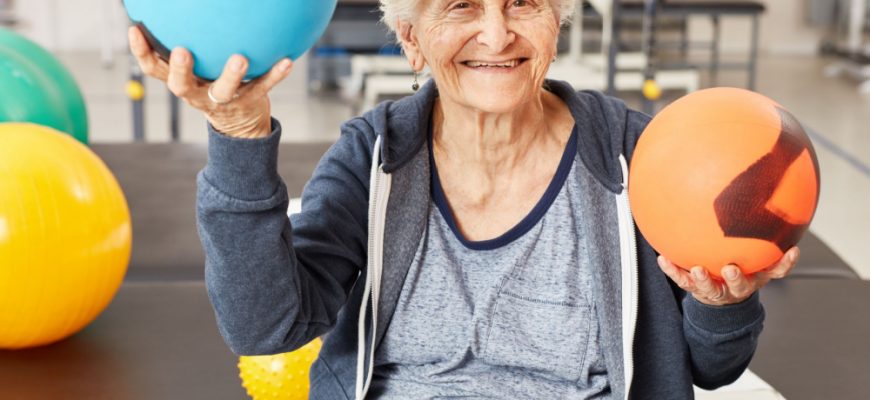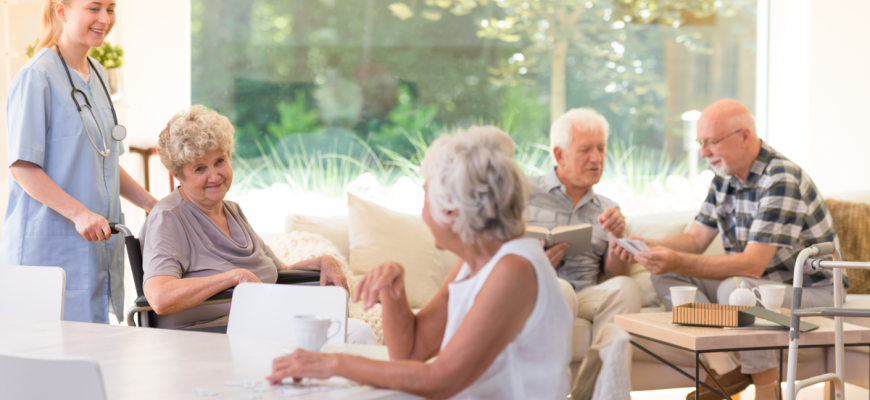Tag Archives: Assisted Living Care

Understanding ADL And IADL For Seniors: A Key To Promote Their Well-Being
As your loved ones age, they may encounter a variety of physical and cognitive changes that can impact their ability to carry out everyday tasks independently. Activities of Daily Living (ADL) and Instrumental Activities of Daily Living (IADL) are two categories of everyday activities that are critical for seniors’ health and well-being. What Are ADL And IADL? ADL is a term that refers to basic activities that individuals carry out every day. These activities are critical for maintaining hygiene, health, and independence. In contrast, IADL refers to activities that are necessary for more complex daily living tasks, such as grocery shopping, managing finances, using transportation, and doing housework. ADL Checklist For Seniors You can use this ADL checklist for seniors to determine if your loved ones need assistance in any of these areas. A few examples of tasks to include are: Bathing: Can your loved one bathe or shower independently, or do they need assistance? Dressing: Can they dress themselves, or do they need help putting on clothes or shoes? Grooming: Can they brush their teeth, comb their hair, and take care of their personal hygiene independently? Toileting: Can they use the toilet, or do they need assistance with incontinence or toileting aids? Eating: Can they prepare their own meals, or do they need assistance with feeding or special utensils? Transferring: Can they move from one place to another, or do they need assistance with a wheelchair, walker, or other mobility aids? IADL Checklist For Seniors Managing Finances: Can they […]
Read More
Benefits of Strong Friendships in Assisted Living Facility
As we age, our health and well-being become increasingly important. While there are many habits we can develop to promote healthy aging, one key aspect is developing strong relationships with our peers. This article will examine the benefits of assisted living and the ways in which senior friendships promote healthy aging. Benefits Of Assisted Living Increased social interaction: Living in an assisted living community provides seniors with numerous opportunities for social interaction and engagement. This can include participating in recreational activities, attending events and programs, and simply enjoying the company of others. These social interactions have been shown to have numerous benefits for seniors, including reducing stress and anxiety, improving mental and physical health, and reducing the risk of depression. Improved safety and security: Assisted living communities are designed to provide a safe and secure environment for seniors. This includes 24-hour monitoring and emergency response systems, as well as staff who are trained to provide assistance with activities of daily living. This peace of mind can help seniors feel more relaxed and secure, which in turn can improve their overall health and well-being. Access to health and wellness services: Many assisted living communities offer on-site health and wellness services, such as physical therapy and wellness programs. These services can help seniors maintain their physical health and mobility, which can help prevent falls and other health issues. Additionally, many assisted living communities also provide access to health care providers, making it easier for seniors to receive the medical care they need. […]
Read More
Understanding The Common Causes Of Balance Issues In Seniors
With age, we can experience many challenges with common things like nutrition, memory, taste and even body balance. As per many senior care experts, balance issues are one of the most common reasons for seniors above the age of sixty-five to see their healthcare providers. Balance issues are very common in seniors and can be caused by a variety of things like age-related changes in the body, health issues, prescription medications, environmental changes, etc. Various coping mechanisms can help elderly adults manage balance issues and some of them are regular exercise, taking safety precautions, and vision correction. It can be quite scary if you or your senior loved one is suffering from balancing problems. This is because the fear of falling can negatively impact the quality of life, and some seniors may even choose to stay more sedentary to avoid worrying about falling. But, a sedentary lifestyle can result in decreased strength, endurance, flexibility, and balance. Luckily, there are many ways to help your senior loved one work on improving balance and as per the experienced caregivers in our senior assisted living facility, it is never too late to begin. Apart from working with your doctor and physical therapist, it can be beneficial to move to a more supportive environment like a senior assisted facility to combat your balance fears. What Causes Balance Issues In Seniors? The first step to improving the balance problem is to understand the cause of the problem. Older adults might experience balance issues due to […]
Read More
Why Retirement Communities Are More Popular Than Before
It is unsurprising that the coronavirus pandemic has badly affected the senior living and retirement living industries. This is especially the case with communities that offer advanced care options for seniors, such as assisted living facilities, memory care and skilled nursing locations. Overwhelming financial loss is associated with the health and advanced age of residents, the quarters that they share as well as their smaller dining halls and social settings. However, independent living communities fare relatively better for the same reasons mentioned above. Different from advanced care service providers, it is the health and age of residents in those communities that benefitted them. Retirement communities continue to be more popular now than ever before. Here, we will discuss some reasons why that is the case. The Epidemic People were searching for retirement living locations and making moves even as families looked away from advanced care service locations as the pandemic was at its peak. The main reason for this is the sense of isolation that senior retirees felt when in shut-off circumstances at home. Pandemic isolation cut off their connections with the outside world as well as reduced what they did for socialization and entertainment. The other reason concerns the desire of people for the facilities that all-inclusive independent living communities could offer. Many communities offer meals, transportation, housekeeping and activities with socialization opportunities in place. Those communities reduced the requirement for recently-retired people to handle everything by themselves. People Pay Attention Again To What Retirement Means A continuing care […]
Read More
A Detailed Guide On Skilled Nursing Care
Skilled nursing care is high-level and complex medical care that is directly supervised by a certified medical professional. These licensed or certified medical professionals usually include a registered nurse, a speech therapist or an occupational therapist, and a physical therapist. Skilled nursing care can be provided in a hospital, skilled nursing facility, rehabilitation center, or the home of the person. Some of the common examples of skilled care are wound care, occupational therapy, physical therapy, IV therapy or maintenance, speech therapy, complex disease management, etc. It is common to require skilled nursing interventions or care while recovering in the hospital after surgery or while building strength to return home. Skilled nursing care does not include the services that are offered by a certified nursing assistant or the tasks done by a senior caregiver. For instance, help with daily hygiene activities like bathing and dressing are not considered skilled nursing care. Skilled Nursing In Assisted Living Communities Many people think that skilled nursing care only happens in hospitals. However, it can also be provided in other places, which include assisted living facilities. Even though assisted living facilities can provide much assistance, the assisted living license provided by their respective state only allows these communities to offer care to only a certain extent. This means that a high level of skilled nursing care is not allowed in assisted living care. Though the residents of assisted living communities receive assistance round the clock from caregivers, there can be times when […]
Read More
Evaluating the Causes of Malnutrition in Seniors and How to Prevent it
Maintaining good nutrition is imperative for the overall health and wellbeing of seniors. However, it is seen that older adults are at an increased risk of malnutrition when compared to younger people. This could be due to many reasons such as low appetite, changes in taste and smell, and inability to enjoy food and following regular eating habits. Yet no matter what the reason is, inadequate nutrition can lead to many complications for seniors. The common problems caused by malnutrition in seniors include a weakened immune system, more likelihood of developing infections, poor wound healing, decreased bone mass, muscle weakness, exhaustion, and more. These problems can lead to a higher risk of hospitalization due to falls or new conditions. In some cases, malnutrition can also increase the risk of death. That is why you need to understand the factors that can lead to malnutrition in your elderly loved one and take adequate steps to prevent it. Assisted living facilities often have staff dedicated to ensuring all residents get proper nutrition. Below are some of the key factors that contribute to malnutrition in seniors. Chronic illnesses and decline in appetite due to any specific disease-related inflammation that affects how the body processes nutrients Difficulties in chewing or swallowing, inability in handling tableware, poor dental health Dementia or other behavioral or memory issues caused due to Alzheimer’s disease Taking medications that suppress appetite or affect the body’s ability to absorb nutrients Dietary restrictions because of any specific medical condition, such as limits […]
Read More
8 Telltale Signs Your Elderly Loved One Needs Help
As your elderly parents or grandparents age, they will need more and more help to manage their day-to-day chores. However, it can be very difficult to determine when you need to step in or when to transition into an assisted living care home. Yet there are some signs, which indicate that it is time to find the right solution for your senior loved one. Below are 8 things that say your older adult needs help, even if they do not admit it. Memory Problems If your loved one is forgetting bill payments or doctor’s appointments too often or has started to lose things around the house more regularly, then it indicates that their memory and cognitive functions are declining. The Aging Life Care Association says that poor memory can indicate the onset of many underlying conditions in seniors, such as dementia. That is why you should consult with a doctor for an evaluation to understand what to do next. Difficulty Getting Around If your senior parent or grandparent is having trouble walking, experience difficulties in navigating the stairs, or cannot get up from a chair or get out of the bed as usual, then you need to hire an in-home care provider to assist them with their daily activities. You can also move them to a senior care home because they maintain a safer living environment for seniors having difficulty getting around. Loss of Appetite If your elderly loved one has started losing weight, becoming dehydrated, or does not […]
Read More
Conducting a Safety Assessment of Your Senior Parent’s Home
Home is the place where you relax, rewind, and restore your overall mood and spirit after a long, tiring day. This makes it important to have a place where you can feel comfortable and at ease. For seniors staying at home, it is even more significant. As an unplanned and unkempt home can pose many kinds of risks and safety concerns for older adults, you need to make sure that your elderly parent’s home is safe for them. Conducting a Safety Assessment of Your Loved One’s Home From accidental falls to fire hazards, there can be many things which can affect the wellbeing of your senior at home. That is why you need to conduct a safety assessment of your senior parent or grandparent’s home to substantiate that they can live there safely. Below is a quick checklist to help you in that regard. Check the Medication Management System It is seen that many of the in-home hazards are caused by improper medication management. In fact, many seniors find themselves in a hospital ER because of the mistakes they make with their medications. It can be because the senior patient either took too much medicine or failed to take the right dose. Therefore, a good medicine management system in place is vital to stay on track of the medication schedule and avoid any risks of overdoses or other issues. Check the Lighting Solutions Proper lighting at your senior’s home is more than a security feature for them. While exterior motion […]
Read More
How Gardening Benefits Seniors in Assisted Living Communities
Gardening has many surprising health benefits for seniors, which is why most assisted living communities promote the activity among their residents. For instance, it keeps seniors engaged and active, while helping to reduce the likelihood of some common ailments associated with aging as well. Below are some of the most amazing benefits of gardening for seniors in assisted living care facilities. It Helps to Burn Calories Aging reduces mobility in seniors, which is why many of them spend their time sitting in one place or sleeping. This kind of inactivity can lead to higher calorie retention in the body, which can cause other complications in seniors. Gardening gives a simple way to exercise and burn calories by pulling weeds and planting seeds. It is even reported that light yard work and gardening can help to burn up to 330 calories in an hour. It Helps to Relieve Stress It is common for seniors to become anxious about a variety of things and stress over them. This could range from their family problems to worrying over their declining health condition. This can lead to restlessness and distress in seniors. Gardening can help to divert their focus and give them the responsibility to take care of their plants. This, in turn, helps to cultivate a sense of purpose and reduces stress and feelings of depression. It Promotes Heart Health Seniors are prone to a wide range of heart diseases due to the weakening of their heart muscles and other health complications. As […]
Read More
Diet Recommendation for Seniors with Congestive Heart Failure
Congestive heart failure is a serious condition that makes the heart muscles weak and severely damaged in seniors. This, in turn, prevents the heart from supplying enough oxygen-rich blood to the body and leads to shortness of breath, fatigue, rapid heartbeat, frequent urges to urinate at night, swollen feet, weight gain, as well as many other complications. Seniors diagnosed with congestive heart failure need proper nutrition and support to cope with its symptoms effectively. That is why nutritionists at assisted living care facilities prepare a low-sodium diet plan for their senior residents. This helps to boost their heart health and allows them to enjoy their day-to-day activities in the senior living community. Below are a few diet recommendations for seniors who have congestive heart failure. Foods to Avoid in the Diet As the heart muscles in seniors with congestive heart failure become weakened, many kinds of foods can damage the heart further. That is why assisted living facilities prepare low-sodium meal plans for such seniors. Foods that have high sodium or salt can cause the body to retain more fluids and lead to increased blood pressure. This can be very dangerous for seniors with congestive heart failure. To steer clear of excessive sodium intake, seniors are advised to avoid consuming foods like frozen dinners, canned soups, smoked, cured, or canned meat, salted snacks and nuts, instant pudding, cottage cheese, salad dressing, and vegetable juice. Aside from that, foods rich in cholesterol and saturated fat should also be avoided to manage […]
Read More